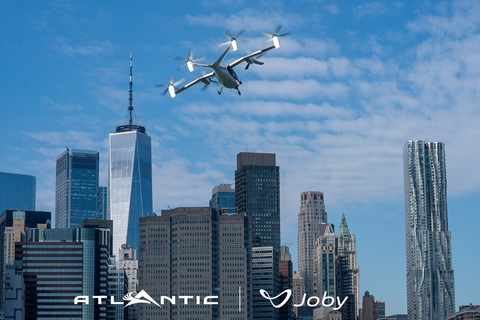Joby and Atlantic Aviation Collaborate to Electrify Infrastructure in New York and Southern California

Joby’s all-electric aircraft in flight above
The collaboration between Joby and Atlantic, a leading provider of aviation services and infrastructure, will focus on activating key Atlantic sites to support quiet, emissions-free air taxis, including the installation of Joby’s Global Electric Aviation Charging System (GEACS). The two companies will undertake a comprehensive analysis of how Joby’s revolutionary air taxi can operate at these locations alongside traditional aircraft and other electric aircraft, offering customers a new way to move from point to point in congested cities that is quieter and more sustainable.
Atlantic has an extensive operational footprint in major cities across
“Infrastructure is a critical piece of the puzzle and Atlantic’s presence in these two key
John Redcay, Chief Commercial & Sustainability Officer at Atlantic, commented, “Our collaboration with Joby is a key step in Atlantic’s push to bring existing aviation infrastructure into the future and solidify Atlantic’s leading role in supporting the growth of electric aviation. We will be a technology-agnostic supporter of advanced air mobility and our work with Joby is a key part of that journey.”
Atlantic is focused on creating technology-agnostic critical infrastructure for aviation. Consistent with its existing business of providing best-in-class FBO services, Atlantic aims to support all aircraft types that arrive at its facilities.
GEACS, the Joby-developed charging system for electric aircraft, is designed to support the safe and efficient operation of electric aircraft under development today, reducing downtime between flights and maximizing the life of aircraft batteries. Joby recently released the technical specifications of GEACS – which is currently installed at Edwards Air Force Base and Joby’s flight testing facility in
“Through more than 30,000 miles of all-electric vertical flight with full-scale prototype aircraft, our team has fine-tuned a ground support system that allows for the simultaneous recharging of multiple battery packs, external coolant exchange, and secure data offload after flight – making it suitable for all electric aircraft,” said Bevirt.
Joby’s air taxi can carry a pilot and four passengers at speeds of up to 200 mph, offering high-speed mobility with a fraction of the noise produced by helicopters and no in-flight emissions.
Joby recently completed the first-ever flight of an electric air taxi in
About Atlantic Aviation
Atlantic Aviation offers customers more than 100 fixed base operations (FBO) locations across
About Joby
Joby Aviation, Inc. (NYSE:JOBY) is a
Forward Looking Statements
This press release contains “forward-looking statements” within the meaning of the “safe harbor” provisions of the Private Securities Litigation Reform Act of 1995, including but not limited to, statements regarding the development and performance of our aircraft and charging system, the growth of our manufacturing capabilities, our regulatory outlook, progress and timing; our business plan, objectives, goals and market opportunity; plans for, and potential benefits of, our strategic partnerships, including our partnership with Atlantic Aviation and plans for potential sites for electrification; and our current expectations relating to our business, financial condition, results of operations, prospects, capital needs and growth of our operations. You can identify forward-looking statements by the fact that they do not relate strictly to historical or current facts. These statements may include words such as “anticipate”, “estimate”, “expect”, “project”, “plan”, “intend”, “believe”, “may”, “will”, “should”, “can have”, “likely” and other words and terms of similar meaning in connection with any discussion of the timing or nature of future operating or financial performance or other events. All forward-looking statements are subject to risks and uncertainties that may cause actual results to differ materially, including: our ability to launch our aerial ridesharing service and the growth of the urban air mobility market generally; our ability to produce aircraft that meet our performance expectations in the volumes and on the timelines that we project, and our ability to launch our service; complexities related to obtaining certification and operating in foreign markets; the competitive environment in which we operate; our future capital needs; our ability to adequately protect and enforce our intellectual property rights; our ability to effectively respond to evolving regulations and standards relating to our aircraft; our reliance on third-party suppliers and service partners; uncertainties related to our estimates of the size of the market for our service and future revenue opportunities; and other important factors discussed in the section titled “Risk Factors” in our Annual Report on Form 10-K, filed with the Securities and Exchange Commission (the “SEC”) on March 1, 2023, and in future filings and other reports we file with or furnish to the SEC. Any such forward-looking statements represent management’s estimates and beliefs as of the date of this press release. While we may elect to update such forward-looking statements at some point in the future, we disclaim any obligation to do so, even if subsequent events cause our views to change.
View source version on businesswire.com: https://www.businesswire.com/news/home/20240117374662/en/
Joby Aviation
Investors:
investors@jobyaviation.com
Media:
press@jobyaviation.com
Atlantic Aviation
Media:
Ivy.Cueto@atlanticaviation.com
Source: Joby Aviation, Inc.







